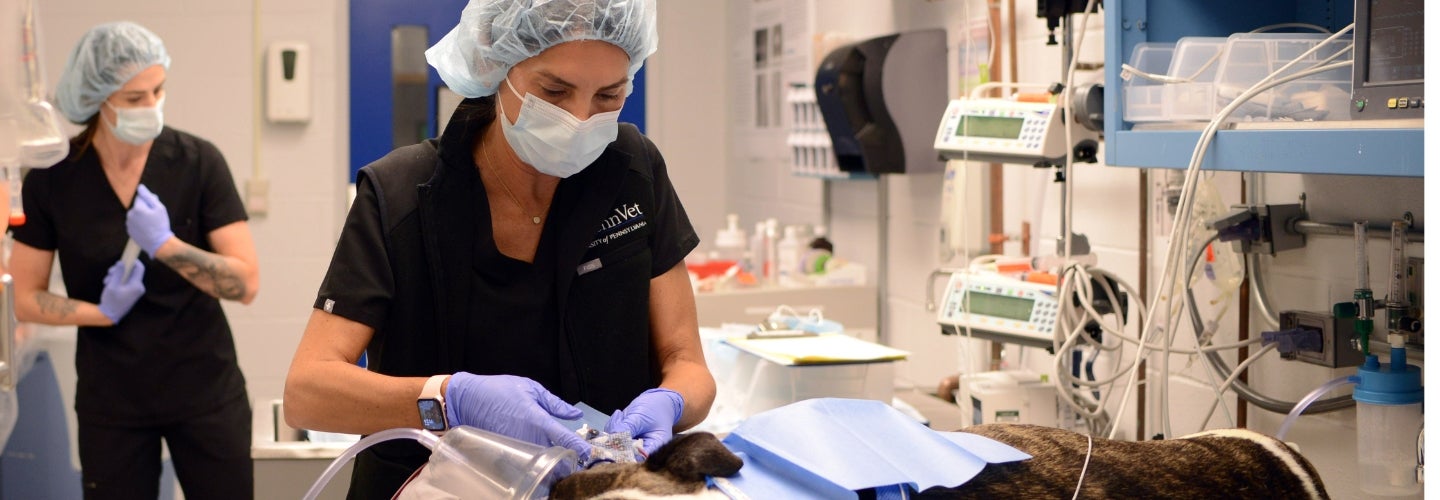
Advanced Urinary Care
What we do
The Penn Vet Advanced Urinary Care service is tailored specifically for patients with both upper and lower urinary tract disease. We provide an integrated experience for patients that suffer from conditions related to kidneys, the bladder, and related organ systems.
Our board-certified internists, surgeons, criticalists, and staff work together to specialize in the medical management of both acute and chronic kidney disease, surgery of the upper and lower urinary tract, renal transplantation, extracorporeal therapies, including hemodialysis, cytapheresis, and plasmapheresis, and minimally invasive, endourological procedures.
Our Services
Symptoms, Diagnosis, and Treatment
Getting an accurate diagnosis is critical in successful treatment planning. At Penn Vet's Ryan Hospital for companion animals we offer the best in diagnostic testing, including radiological services such as radiographs, ultrasound, computed tomography (CT) scans, and magnetic resonance imaging (MRI).
Our Services
Symptoms, Diagnosis, and Treatment
Getting an accurate diagnosis is critical in successful treatment planning. At Penn Vet's Ryan Hospital for companion animals we offer the best in diagnostic testing, including radiological services such as radiographs, ultrasound, computed tomography (CT) scans, and magnetic resonance imaging (MRI).
Symptoms animals can display:
- Difficulty or small amounts of urination
- Bloody or cloudy urine
- Fever
- Loss of bladder control
- Increased urgency or volume of urination
- Pain or straining during urination
- Accidents in inappropriate places
- Excessive licking of the urinary area
- Strong-smelling urine
- Lethargy
- Vomiting
Causes can include:
- Congenital abnormalities
- Prostate disease
- Stones, crystals, or debris
- Infection or inflammation
- Ingestion of toxic substances
- Trauma
- Cancer
- Stress
- Spinal cord abnormalities
Diagnosis and Treatment
When your pet is diagnosed with a urinary tract issue, it’s essential to consider all available treatment options. These may include nutritional modifications, medical therapy, and surgical intervention. At Ryan Hospital, our team-based clinical approach is designed to meet your pet’s needs effectively.
Once a proper diagnosis is established, we will create a tailored treatment plan, potentially utilizing the following services:
Medical Management | Internal Medicine – would work with our team in to apply the most advanced diagnostic methods and treatments existing.
Nutritional Management | The Nutritionist on staff would provide recommendations and expertise for your pets with urological problems and diseases.
Advanced Procedures | Extracorporeal Therapies – including hemodialysis and therapeutic plasma exchange, would provide procedures that utilize technologies to filter the blood.
Surgical Options | Surgery – may be needed and our hospital provides a range of options such as minimally invasive and soft-tissue.
Minimally Invasive Options | Interventional Radiology – provides the pet owner the option to pursue treatment while having shorter hospital stays and anesthesia times.
Feline Renal Transplantation | Renal Transplantation – a technically challenging procedure treatment option for renal failure in cats.
Penn Vet offers advanced procedures unique to specialty hospitals, such as ureterotomy, ureteral reimplantation, minimally invasive procedures, urinary tract stent placements, laser ablation of ectopic ureters, and renal transplantation. Additionally, as one of the nation’s leading academic diagnostic laboratories, we can quickly process tissue, urine, and blood samples on-site, ensuring timely results for your pet’s care.
Urological Diseases and Conditions
There are many conditions that can affect the upper and lower urinary tract of animals, including congenital abnormalities, incontinence, infection, stone disease, toxicities, renal failure, and cancer.
Urinary obstruction is a medical emergency and requires immediate treatment through an emergency service. If you believe your animal is experiencing a medical emergency, please contact Ryan Emergency Service at (215) 746-8911.
Lower urinary tract infection, or UTI, is also referred to as “bladder infection” or “cystitis.” A UTI occurs when bacteria colonize the urinary tract.The first signs of a lower urinary tract infection are increased frequency of urination, straining to urinate, and inappropriate urination. Further symptoms include foul urine odor or blood in the urine. To treat this condition, a urine sample needs to be analyzed and the bacteria identified such that your veterinarian can prescribe the appropriate antibiotic. If the infection involves the kidneys, this is referred to as pyelonephritis.
Bladder stones are formed by the accumulation of urine crystals. Urine properties and underlying metabolic conditions may influence the formation of urine crystals. Bladder stones result with the oversaturation of crystals in urine.
Urinary tract infections can be associated with bladder stones. Smaller stones may become lodged in the urethra, especially in male animals, causing urinary tract obstruction and the inability to urinate. If left untreated, this condition can result in severe electrolyte abnormalities, acute kidney failure, and even death within a few days.
When urine crystals combine with mucus along the urinary tract in cats, these can form a plug in the urethra that blocks urine flow. Symptoms include straining to urinate with little or no urine production, crying, blood in the urine, and inappropriate urination. An animal that is unable to pass urine can die within a day or two, if left untreated.
Once a cat has had FUS, recurring blockage can become a problem and can be life-threatening if not treated. Treatment may include special diet, medical therapy, or surgical options.
Blockage of urine can also occur in one or both of the ureters. The ureters connect the kidneys to the bladder. Bladder stones in dogs and crystal/mucus plugs in cats are usually the causes of urethral tract obstruction. Ureteral obstruction can occur secondary to stones, fibrous material, stricture, or cancer, among other causes.
An animal is incontinent when they cannot control urination normally. Sometimes, an animal is born incontinent and unable to control urination. This condition is more common in dogs than cats. Signs include dribbling when the animal is not actively trying to urinate, urine-soaked fur around the tail or hind leg area, and spots of urine wherever the dog has been lying down.
There are numerous causes for this problem, including hormonal abnormalities, congenital disorders, urinary tract infection, muscle weakening, neurologic disease, and more. In most cases, incontinence can be controlled with drug therapy. However, urethral bulking and surgical options may be pursued in severe or refractory cases.
The kidneys play an important role in many body functions by helping to control blood pressure and regulate the chemical makeup of the blood. They produce hormones and enzymes and contribute to the production of red blood cells. They also remove metabolic waste from blood. When the kidneys no longer function properly, and the blood is not properly filtered as a result, severe complications ensue.
An animal with kidney disease can be diagnosed with either acute or chronic renal failure. In acute renal failure, there is a rapid onset of symptoms, while chronic renal failure progresses over a longer period of time. The most common causes of acute kidney disease is the ingestion of toxic substances such as antifreeze, Lily plants, grapes, raisins, and certain types of human medications, or obstruction.
If diagnosed early and treated immediately, acute failure or damage can be reversible. Chronic kidney disease is not reversible. It is the result of the deterioration of kidney tissue and progresses over many months or years.
Animals with kidney failure require a global approach to therapy. Diet, medications and blood pressure control, hemodialysis, and renal transplantation may be considered.
Our Care Team

Director, Advanced Urinary Care
Lillian Aronson, VMD, DACVS
Renal Transplant Program Founder and Coordinator, Section of Surgery
Veterinarians
Residents and Staff
Lara Derr, CVT, LTS (Emergency Care)
Interventional Radiology Veterinary Nurse
Cynthia Spano CVT
Renal Transplantation Nurse
Research in Advanced Urinary Care
Our clinical research team within Penn Vet’s Advanced Urinary Care service includes translational immunologists, transplant immunologists and surgeons, and extracorporeal therapy criticalists who are exploring the adoptive transfer of immune regulatory cell types such as regulatory T cells (Tregs) and iNKT cells to promote immune tolerance.
Our goal is to apply our combined expertise to develop canine immune regulatory cellular therapies that can be used either alone or in combination with other immunomodulatory platforms to enable successful allogeneic renal transfer in canines with chronic renal failure.
Transplantation Immunology within Advanced Urinary Care
Rejection of major histocompatibility unmatched, allogeneic tissues and cells are a significant barrier to successful organ transplant and off-the-shelf, genetically engineered adoptive T cell therapies. Overcoming this barrier by exploiting the beneficial effects of immune regulatory cells would enable more patients to receive life-saving organ transplants or adoptive T cell therapies that have the potential to cure patients with hematological and solid cancers.
Our clinical research team within Penn Vet’s Advanced Urinary Care service includes translational immunologists, transplant immunologists and surgeons, and extracorporeal therapy criticalists who are exploring the adoptive transfer of immune regulatory cell types such as regulatory T cells (Tregs) and iNKT cells to promote immune tolerance.
Our group has significant expertise in transplant immunology and renal transplant surgery and in the generation and use of adoptive cellular therapies in canine cancer patients.
Our goal is to apply our combined expertise to develop canine immune regulatory cellular therapies that can be used either alone or in combination with other immunomodulatory platforms to enable successful allogeneic renal transfer in canines with chronic renal failure.
Ryan Veterinary Hospital
Emergencies:
(215) 746-8911
By Appointment:
(215) 746-8387









